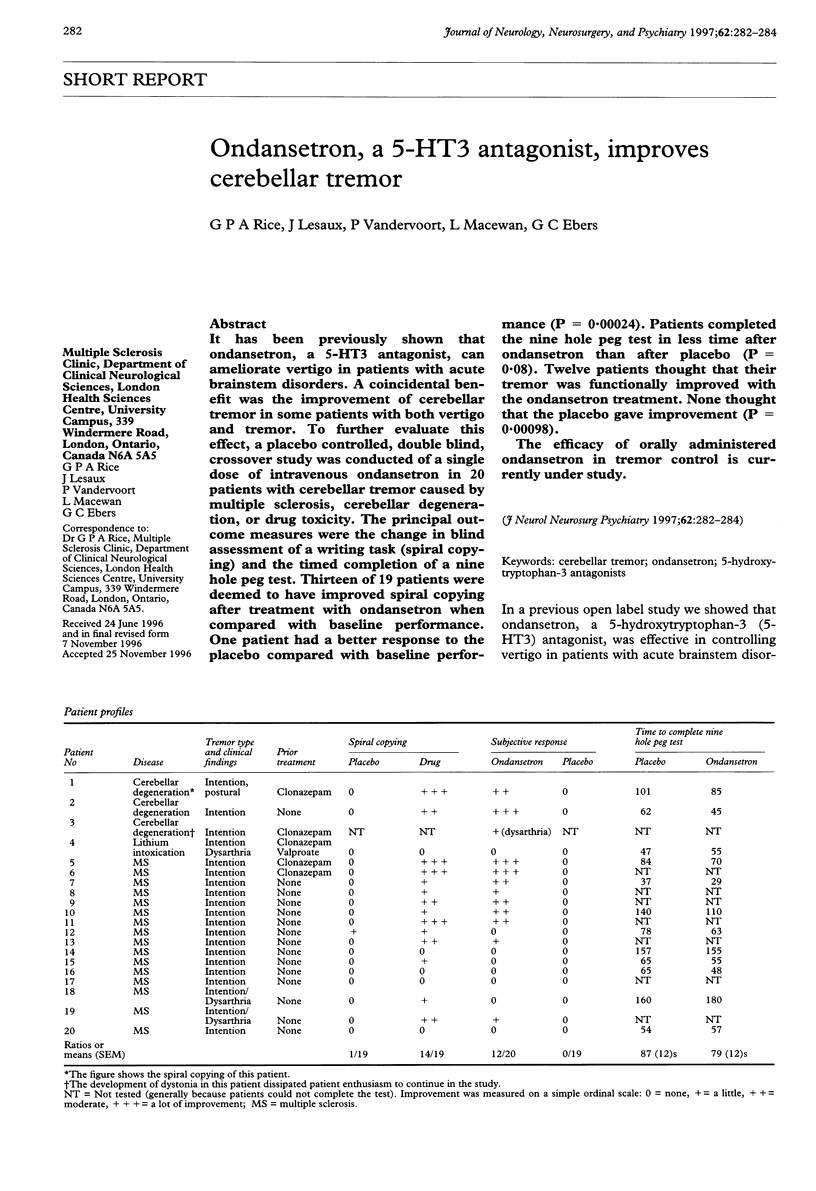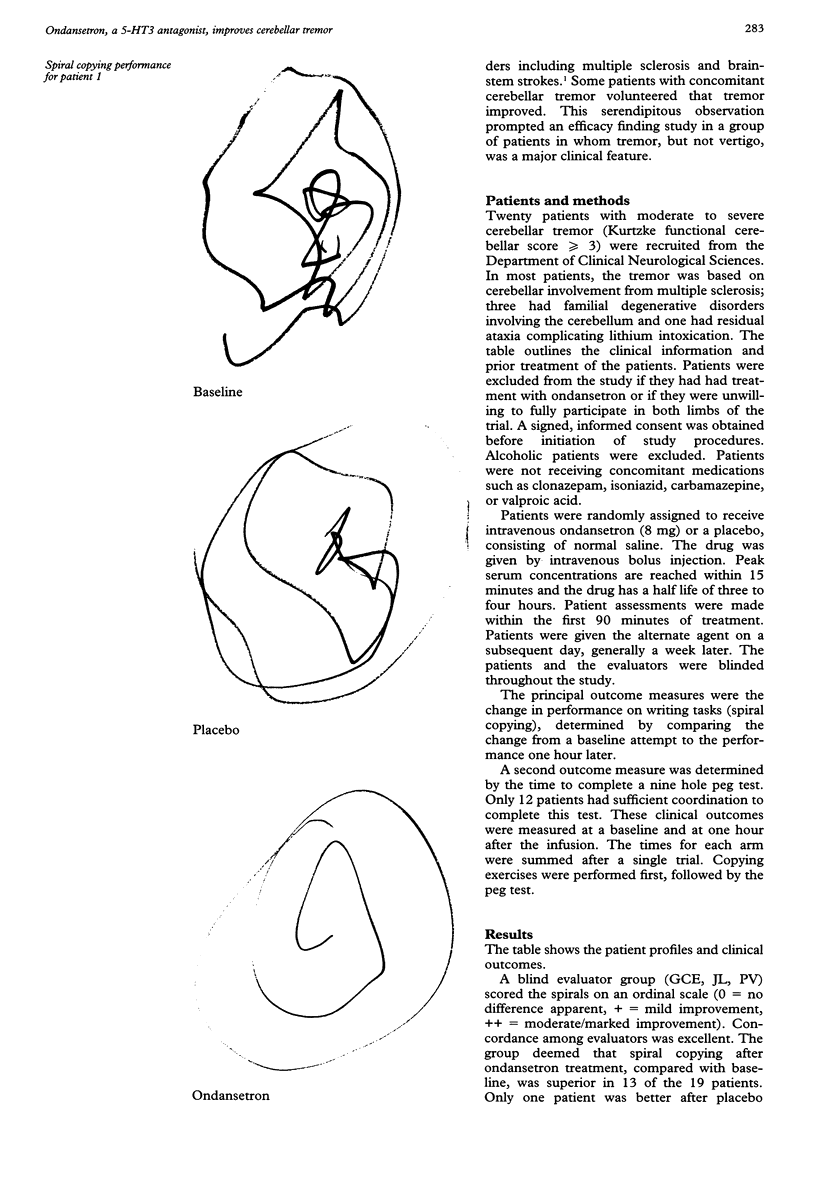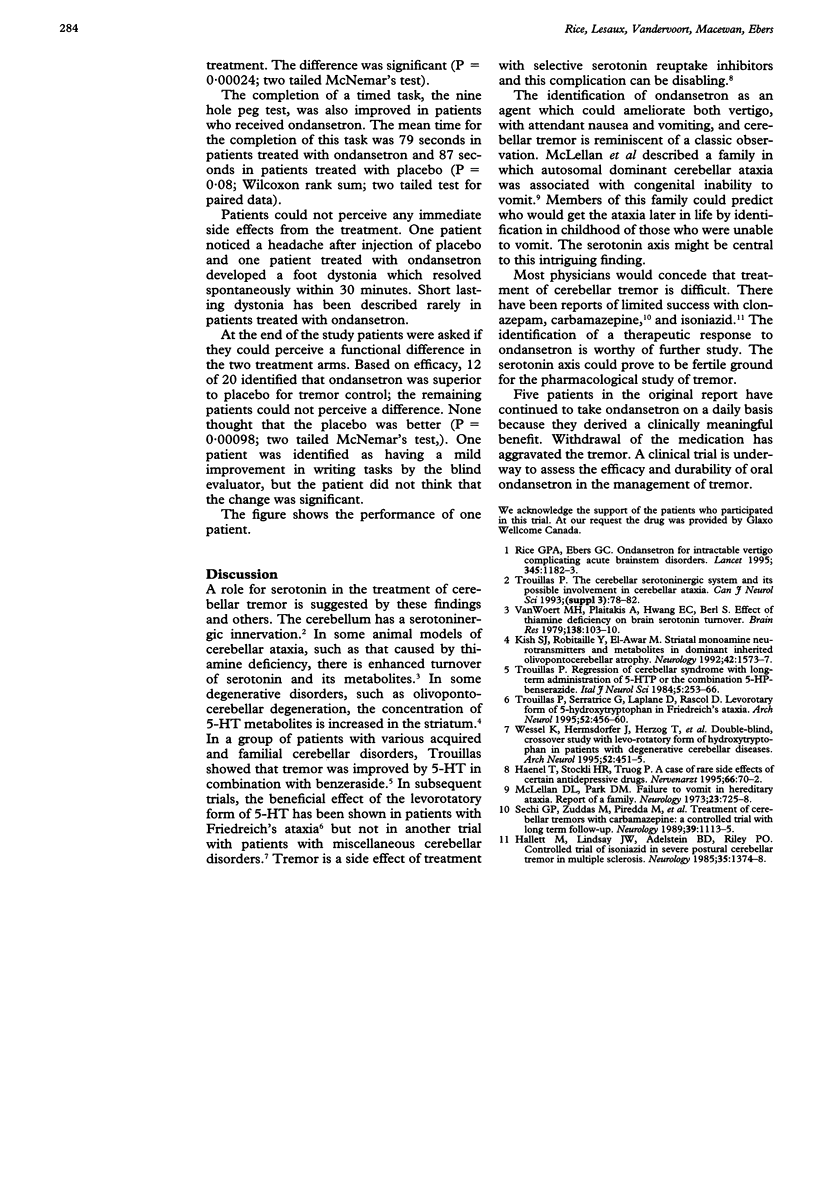Abstract
It has been previously shown that ondansetron, a 5-HT3 antagonist, can ameliorate vertigo in patients with acute brainstem disorders. A coincidental benefit was the improvement of cerebellar tremor in some patients with both vertigo and tremor. To further evaluate this effect, a placebo controlled, double blind, crossover study was conducted of a single dose of intravenous ondansetron in 20 patients with cerebellar tremor caused by multiple sclerosis, cerebellar degeneration, or drug toxicity. The principal outcome measures were the change in blind assessment of a writing task (spiral copying) and the timed completion of a nine hole peg test. Thirteen of 19 patients were deemed to have improved spiral copying after treatment with ondansetron when compared with baseline performance. One patient had a better response to the placebo compared with baseline performance (P = 0.00024). Patients completed the nine hole peg test in less time after ondansetron than after placebo (P = 0.08). Twelve patients thought that their tremor was functionally improved with the ondansetron treatment. None thought that the placebo gave improvement (P = 0.00098). The efficacy of orally administered ondansetron in tremor control is currently under study.
Full text
PDF


Selected References
These references are in PubMed. This may not be the complete list of references from this article.
- Haenel T., Stöckli H. R., Truog P. Ein Fall von seltenen Nebenwirkungen gewisser Antidepressiva. Nervenarzt. 1995 Jan;66(1):70–72. [PubMed] [Google Scholar]
- Hallett M., Lindsey J. W., Adelstein B. D., Riley P. O. Controlled trial of isoniazid therapy for severe postural cerebellar tremor in multiple sclerosis. Neurology. 1985 Sep;35(9):1374–1377. doi: 10.1212/wnl.35.9.1374. [DOI] [PubMed] [Google Scholar]
- Kish S. J., Robitaille Y., el-Awar M., Clark B., Schut L., Ball M. J., Young L. T., Currier R., Shannak K. Striatal monoamine neurotransmitters and metabolites in dominantly inherited olivopontocerebellar atrophy. Neurology. 1992 Aug;42(8):1573–1577. doi: 10.1212/wnl.42.8.1573. [DOI] [PubMed] [Google Scholar]
- McLellan D. L., Park D. M. Failure to vomit in hereditary ataxia. Report of a family. Neurology. 1973 Jul;23(7):725–728. doi: 10.1212/wnl.23.7.725. [DOI] [PubMed] [Google Scholar]
- Rice G. P., Ebers G. C. Ondansetron for intractable vertigo complicating acute brainstem disorders. Lancet. 1995 May 6;345(8958):1182–1183. [PubMed] [Google Scholar]
- Sechi G. P., Zuddas M., Piredda M., Agnetti V., Sau G., Piras M. L., Tanca S., Rosati G. Treatment of cerebellar tremors with carbamazepine: a controlled trial with long-term follow-up. Neurology. 1989 Aug;39(8):1113–1115. doi: 10.1212/wnl.39.8.1113. [DOI] [PubMed] [Google Scholar]
- Trouillas P. Regression of cerebellar syndrome with long-term administration of 5-HTP or the combination 5-HTP-benserazide. Ital J Neurol Sci. 1984 Sep;5(3):253–266. doi: 10.1007/BF02043955. [DOI] [PubMed] [Google Scholar]
- Trouillas P., Serratrice G., Laplane D., Rascol A., Augustin P., Barroche G., Clanet M., Degos C. F., Desnuelle C., Dumas R. Levorotatory form of 5-hydroxytryptophan in Friedreich's ataxia. Results of a double-blind drug-placebo cooperative study. Arch Neurol. 1995 May;52(5):456–460. doi: 10.1001/archneur.1995.00540290042016. [DOI] [PubMed] [Google Scholar]
- Van Woert M. H., Plaitakis A., Hwang E. C., Berl S. Effect of thiamine deficiency on brain serotonin turnover. Brain Res. 1979 Dec 21;179(1):103–110. doi: 10.1016/0006-8993(79)90494-3. [DOI] [PubMed] [Google Scholar]
- Wessel K., Hermsdörfer J., Deger K., Herzog T., Huss G. P., Kömpf D., Mai N., Schimrigk K., Wittkämper A., Ziegler W. Double-blind crossover study with levorotatory form of hydroxytryptophan in patients with degenerative cerebellar diseases. Arch Neurol. 1995 May;52(5):451–455. doi: 10.1001/archneur.1995.00540290037015. [DOI] [PubMed] [Google Scholar]


